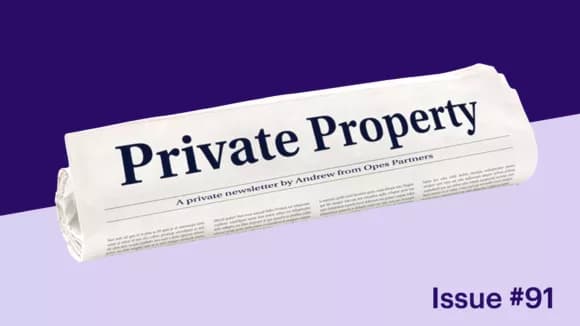
Property Investment
Property Investment
3 min read

Author: Andrew Nicol
Managing Director, 20+ Years' Experience Investing In Property, Author & Host
Reviewed by: Laine Moger
Journalist and Property Educator, holds a Bachelor of Communication (Honours) from Massey University.
2023 has been a massive year for property investors. So much has happened that you’ve probably forgotten what went on this year.
For the last issue of Private Property in 2023, let’s look at everything that happened.
The year began with the devastating Auckland Anniversary floods. The weather damaged much of the city.
Auckland Council assessors went through 6,000 – 8,000 homes, looking for damage. Niwa described it as a 1 in 200 weather event.
This got us all thinking about flood-prone areas, where we buy, and how we protect our properties.
But that wasn’t Mother Nature's only weather event this year.
2 weeks later, Cyclone Gabrielle hit Gisborne, Hawkes Bay and Auckland. These regions are still recovering.
The two events caused up to $14.5 billion in damage.
In March, Silicon Valley Bank collapsed. Some Kiwis feared another global financial crisis.
You might have thought: “If a big bank in the States falls over … what does that mean for my local bank?”
Thankfully, many of us haven’t felt the impacts of this.
Around this time, investors worried about Evergrande, the large Chinese property developer. They have until early next year to restructure their debts.
The Reserve Bank gave us a double dose in April.
They announced their new debt-to-income (DTI) framework. They haven’t put it into practice (yet), but banks are busy preparing.
I expect Adrian Orr to bring them in later, next year.
Around the same time, the bank loosened the LVR restrictions.
Investors could buy properties with a slightly lower deposit. And more first-home buyers could access low-deposit lending.
At the start of the year, the OCR was 4.25%. 5 months later, it was 5.5% (up 1.25%). This looks like the peak.
Since then, interest rates are up. Inflation is down.
House prices also bottomed out in May. Although we wouldn’t know that for a few months.
Everyone panicked when GDP fell 0.1% in the June quarter.
That meant GDP fell 2 quarters in a row. The country was officially in a technical recession.
But in September, Stats NZ updated their numbers. It showed that we were never in a technical recession at all.
Here's something interesting. Stats NZ released new figures last week showing there was a recession 9-12 months ago. We’ll see if that sticks around next time they update their figures.
We had the election in October, but it wouldn’t be another month until we had a new government.
The centre-right parties had proposed a lot of property investor-friendly policies. But at that point, we didn’t know what would survive coalition negotiations.
The new government confirmed that –
These changes will boost the (already recovering) property market. This boost is in addition to staggering net migration. It’s the highest it’s been since records began in 1979.
{insert graph from data hub}
Migration added 128,000 people to our population over the last 12 months. That’s more than right before the border closed during the Covid lockdowns.
This adds demand to the property market. It will push rents and property prices up.
Looking back at 2023:
The property market is doing better than it has in a long time. If you already invest, you probably feel better than last year.
If you plan to invest in 2024, there are opportunities out there for you.
This is my final Private Property for this year. I’ll be back in mid-January to keep you updated with the latest property investment news.
Managing Director, 20+ Years' Experience Investing In Property, Author & Host
Andrew Nicol, Managing Director at Opes Partners, is a seasoned financial adviser and property investment expert with 20+ years of experience. With 40 investment properties, he hosts the Property Academy Podcast, co-authored 'Wealth Plan' with Ed Mcknight, and has helped 1,894 Kiwis achieve financial security through property investment.
This article is for your general information. It’s not financial advice. See here for details about our Financial Advice Provider Disclosure. So Opes isn’t telling you what to do with your own money.
We’ve made every effort to make sure the information is accurate. But we occasionally get the odd fact wrong. Make sure you do your own research or talk to a financial adviser before making any investment decisions.
You might like to use us or another financial adviser